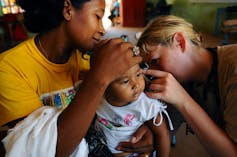This week has seen some good news for the healthcare system, and for all of us who access it. The potentially regressive and mistargeted co-payment from the federal government has finally been abandoned (for real).
It seems for today at least, logic and equity have won out.

The public backlash against the proposed plan to make us all pay to see our local doctor, was swift and intense. Discussions rightly focused on the potential for the policy to price poorer members of our community out of healthcare, and create barriers to early diagnosis, treatment and more cost-effective care. In short, the Australian community spoke up and showed their clear disapproval for the measure - a reaction that achieved its intention.
But all this discussion about access to GPs and our frontline of health got me thinking.
Why is it that we should and must be so protective of our primary care system? Is there a bigger lesson to learn from all this?
What is Primary Care and why does it matter?
Primary care is the level of a health system that provides entry into healthcare provision for all new needs and problems. It’s the frontline of the healthcare system and provides person-focused care over time; care for all but very uncommon or unusual conditions; and coordinates or integrates care, regardless of where the care is delivered and who provides it.
It’s the means by which the two main goals of a health system, optimisation and equity of health status, are approached.
So what does it all boil down to?
In other words, primary care is an effective, efficient and important sentinel for our entire healthcare system. But how?
1. They’re the front line and they’re valuable

First of all, primary care practitioners are the frontline of medicine - not only for patients, but also for the system itself. Think of it as the ‘gate keepers’ who see, triage and optimise care. The more supported and effective they are in their role, the quicker disease is diagnosed, managed and treated.
Second, it’s often helpful to remind ourselves that whilst universal healthcare might seem a given to us, it is actually far from universal - globally. Australians are extremely fortunate to have round-the-clock access to high-quality healthcare.
This is something we should remember to celebrate and protect.
2. Good care saves us money
Although primary care might have seemed like a big economic drain to the government, it’s actually an important investment in Australia’s future. Study after study shows the cost-effectiveness of increasing access and decreasing barriers to primary care - even for our most remote communities. Treating disease early is far less costly.
3. Primary Care affords a lifetime of health
Primary Care, including General Practice, relies on patients having regular and reasonable access to their practitioners over a period of many years. It is through this long-term investment that they are able to develop and tailor the care to the individual patient over their life-course, and sometimes beyond into subsequent generations. It is also where our system delivers whole-of-life care, including obstetric and prenatal care, child and adolescent health, adult medicine, preventative care and geriatrics.
4. It’s where it’s at
For those who have read my column before, you’d know that the leading causes of death in Australia are now Non-Communicable Diseases, or chronic conditions like heart disease, cancer, diabetes and lung disease. The good news though, is that these diseases are often preventable (for example 80% of diabetes and heart disease and 1 in 3 cancer cases). Health promotion, screening and early diagnosis are key for these conditions and a few months delay in finding a positive result could be the difference between health and long-term disability, or worse.
Primary care is the main stage for prevention (both the kind that keeps you well and the kind that finds early disease and treats it) and for this reason, many patients will not need to go further than the frontline. For the same reason though, the frontline needs to be accessible and affordable to everyone.
5. Less is less

When it comes to primary care, the message is clear; less is less. And it seems that we as a community get this, given our reaction to the government’s fee proposal. Creating barriers to primary care as a way to reduce healthcare costs is a false economy that will end with greater suffering, later presentations of disease and likely greater eventual cost to the tax-payers. There might be places to cut our spending, and facing an ageing population, efficiencies (not being used as a euphemism for a cut) are going to be crucial. But cutting budgets from the frontline of medicine make no sense, simply delay and even increase the overall costs to the Australian tax payers, and are likely to result in poorer health outcomes for us all in the meantime.
Whatsmore, cutting this part of the system cuts at those most vulnerable. The elderly, those with chronic illness and those living with disability - as these are the communities most reliant on regular care, and these are the communities we all have a responsibility to support.
Care.
As the government winds back its threats on what was a nonsensical tax on illness, let’s not miss the opportunity to learn a deeper, wider lesson here. Primary care might not have ‘the machines that go bing’ or be the shiniest part of the healthcare system, but as a nation facing a growing, ageing population with higher levels of preventable, chronic disease, its arguably the most important.
The battle might have been won, but let’s keep fighting the good fight. A few reflections on why we all should care about primary care.
This article is dedicated to all our frontline health providers including the doctors, nurses and paramedics who run our general practice and emergency care - and who embody excellence, equity and dedication in primary care.

Follow Sandro on Twitter via @SandroDemaio
